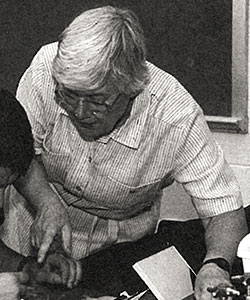Anne Fry '15 HON, Ph.D.
When She Taught, Everything Just Made Sense
As an Emeritus Professor, Anne Fry, Ph.D., '15 HON, has been a champion of the liberal arts, and most specifically, Ohio Wesleyan University since she joined the faculty in 1969.
 Within the zoology department, Anne developed a reputation as a strong researcher and a demanding, fair, and inspiring teacher. Anne became the youngest faculty member to receive Ohio Wesleyan's Welch Meritorious Teaching Award, which is given to Ohio Wesleyan professors who have made a significant contribution to the academic climate at the University. In short, she became the kind of teacher/researcher from whom she drew inspiration as an undergraduate at Mt. Holyoke College.
Within the zoology department, Anne developed a reputation as a strong researcher and a demanding, fair, and inspiring teacher. Anne became the youngest faculty member to receive Ohio Wesleyan's Welch Meritorious Teaching Award, which is given to Ohio Wesleyan professors who have made a significant contribution to the academic climate at the University. In short, she became the kind of teacher/researcher from whom she drew inspiration as an undergraduate at Mt. Holyoke College.
Heather Nardin Klumpp '93, a former student, shares with fondness her relationship with Anne as a student and a friend.
"Dr. Fry was one of my favorite professors at OWU. When she taught, everything just made sense. Not only that, she wanted every one of her students to succeed in her class, and she really cared about each one of us. As a nurse, I have carried what I learned from her throughout my career. I have been lucky enough to continue to have a relationship with her long after my graduation. She continues to care deeply about learning, and she still strives to share her knowledge with others. My life has been immensely blessed by knowing her."
Anne retired from Ohio Wesleyan in 2004 but has remained active and invested in the University since. Her dedication to OWU was recognized with the awarding of honorary alumni status in 2015.
With her unwavering passion and expertise in zoology and biological sciences, Professor Anne E. Fry leaves a lasting legacy at Ohio Wesleyan University that continues to inspire positive change.
What are your favorite memories of Ohio Wesleyan?
I have many good memories seeing students who struggled their first year come into their own subsequently, carrying into upper-level courses approaches or concepts that I hoped they had grasped in an intro course, and doing well in graduate and professional schools and their careers.
I am very fortunate to have spent my career at OWU; it was an excellent match for me. I liked the students and felt supported by my colleagues and the institution. As a member of an active and involved faculty, I appreciated having some say in the academic governance of the institution.
Spending my last year teaching in the new Science Center, with its expanded space and improved facilities, was a great way to end my career. And SCSC contributed to a bright future for the sciences.
What was your favorite course to teach?
I really enjoyed them all! In some ways, it would be the introductory course (Intro to Cell Biology) because it provided students with basic factual knowledge and approaches that could be used in subsequent courses. I was helping provide a foundation for their future study.
Were there any big surprises during your teaching career?
No. Fortunately, I retired well before COVID-19; teaching remotely would have been a huge and exceedingly difficult challenge!
What did you learn from your students?
Some of the questions they asked in class led me to see relationships that I had not thought of. This was both enlightening and refreshing.
What have you been up to since retiring from OWU?
I volunteered for 13 years in the OWU Historical Collection in Beeghly. While indexing the OWU Magazine and going through old Transcripts, I began to collect references to zoology. This led me to write a History of Zoology at Ohio Wesleyan, available on OWU's Digital Commons.
This summer, I moved to a retirement community in Spokane, Washington, which brought me closer to family.
What advice would you give to faculty just starting out at OWU? Or perhaps for students?
One of the things I most valued in my undergraduate experience at Mount Holyoke College was being stretched—finding that I could perform academically and non-academically at a level I would not have thought likely. Academically, this was made possible by a very supportive faculty. I tried to provide students here with this same experience and found that they responded to my academic demands, provided that I gave them support. So, don't be afraid to be demanding, but provide support.
Be enthusiastic about your teaching and interactions with students; if you aren't, they won't be either. Enthusiasm must be genuine, but it can also be quiet or boisterous.
Given all the digital resources available now, this may not be as relevant, but if a student asks a question in class that you do not know the answer to, find it and let the class know. Remember to do this; it allows students to see that you take them seriously.
